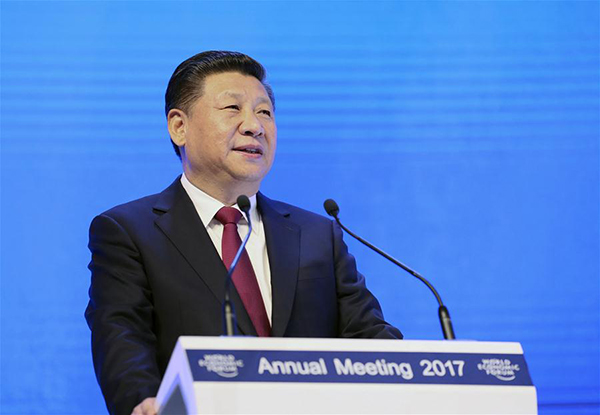Xi's statecraft vs Trump's sales pitch


US President Donald Trump's attendance at the World Economic Forum in Davos, Switzerland, was a hotly anticipated affair because the last US president to attend the forum was Bill Clinton in 2000. And since Chinese President Xi Jinping's attendance at the forum last year was a big hit, political leaders, and senior movers and shakers from the world's economic and financial sectors were all busy making comparisons between the substance and performance of the two presidents who are leading the world's largest and second-largest economies.
Based on the contents, visions and ambitions contained in the two presidents' speeches a year apart, the distinctions were quite visible.
Last year, Xi was able to demonstrate statesmanship throughout his speech while this year, Trump succeeded in portraying himself at best as a good salesman of the American dream as he rallied business leaders to "bring business, jobs and investments to the United States". That was not surprising, as Trump is a businessman first and a politician second.
Xi's speech focused on how China has to shoulder responsibilities as well as promote global growth, whereas Trump's speech emphasized on how US citizens have benefited since his election and more or less delivered his sales pitch to the assembled gathering by proclaiming that the US is "open for business".
It was clear from Xi's observations that integration into the global economy would yield both positive and negative results, but whatever the challenges may be they must be met head on. Trump, on the other hand, looked upon his election success as "Year Zero" and made clear his role is to usher in a new chapter in US history. It was not surprising, therefore, that Trump encouraged everyone at the forum "to hire, to build, to invest and to grow" in the US, in accordance with his "America First" policy.
Unlike Trump, who projected himself as the "alpha male" that is always in control, Xi emerged as someone who shared his vision with other key global players, such as the International Monetary Fund and the World Trade Organization. He acknowledged that to address problems emanating from globalization would require courage and resolve. Xi also recognized that the path to global economic growth is never going to be smooth and countries must take actions to address them and put people's interests first.
In contrast, Trump blamed unelected bureaucrats for American "overregulation". One hopes that he is aware of the fact that he is on record as the president who signed the most executive orders and presidential memorandums since taking office. This is a case of "do as I say and not do as I do".
In his 2017 speech, Xi expressed his concerns over economic growth, governance and development models. He advocated the development of a dynamic, innovation-driven growth model, a model of open and win-win cooperation, fair and equitable governance, balanced, equitable and inclusive development for all-all the virtues that a China steeped in history and culture can offer. Whereas Trump was more concerned with unfair economic practices, intellectual property theft, industrial subsidies and state-led economic planning, insisting on fair and reciprocal trade.
China's emergence on the world stage has been viewed with caution, sometimes even with suspicion. Xi reminded world leaders in 2017 that despite being a developing country, China has been able to make significant contributions not just in outbound and inward investments but also in delivering significant foreign assistance projects across the globe-something the US has failed miserably at. Instead, the US has been directly involved in conflicts in Afghanistan, Iraq and Syria.
Globalization has its benefits and obstacles that are clear for all to see. It will take great leaders who understand the pitfalls and recognize its potential to nurture and develop it. One believes that less finger pointing toward developing countries such as China will facilitate better growth and development for all concerned.
The author is the director of the Chinese in Britain Forum. He is the first Chinese British citizen to be elected mayor of the Greater London Borough of Redbridge (2009-10) and serve as a member of the city council for over 10 years.
































